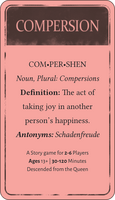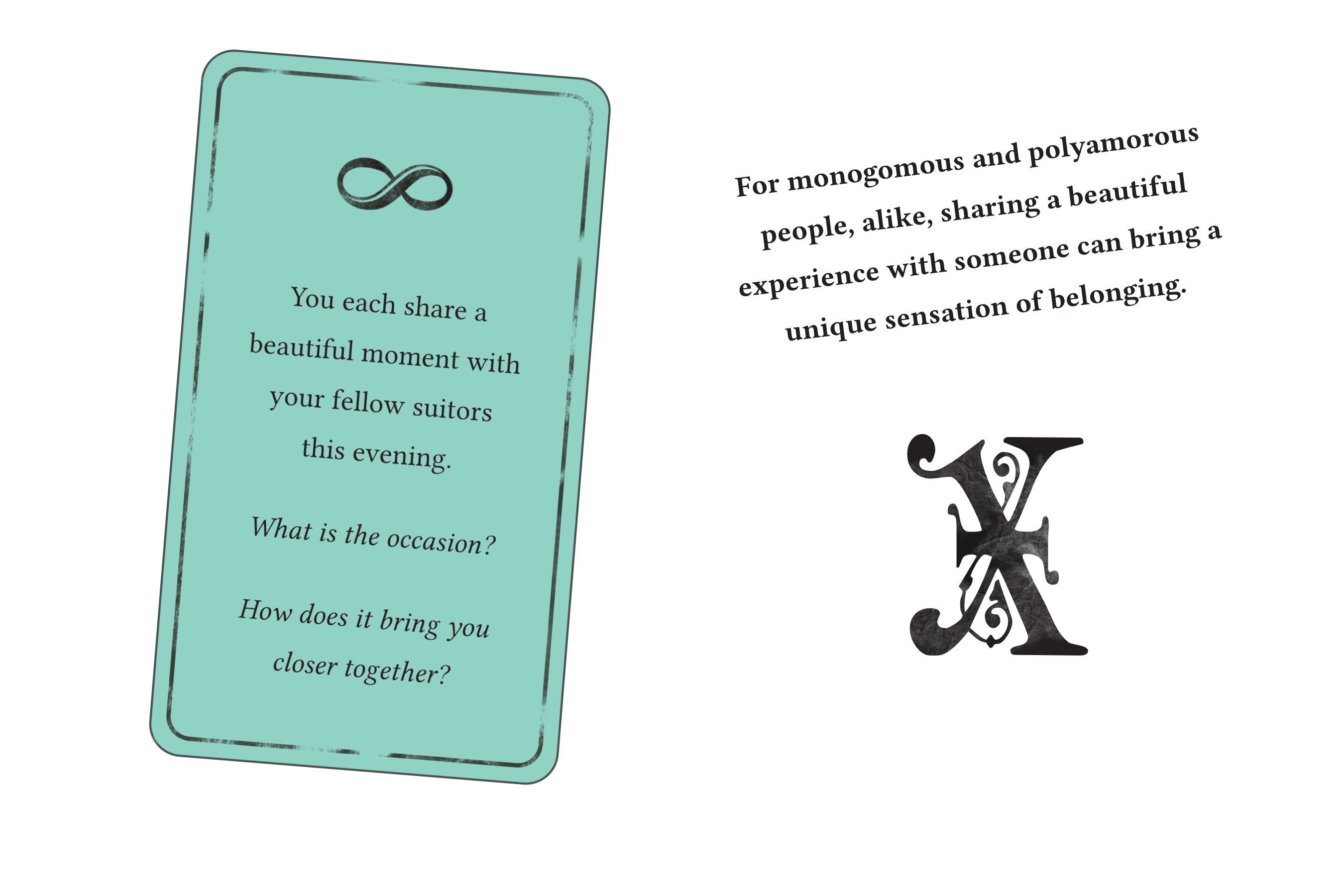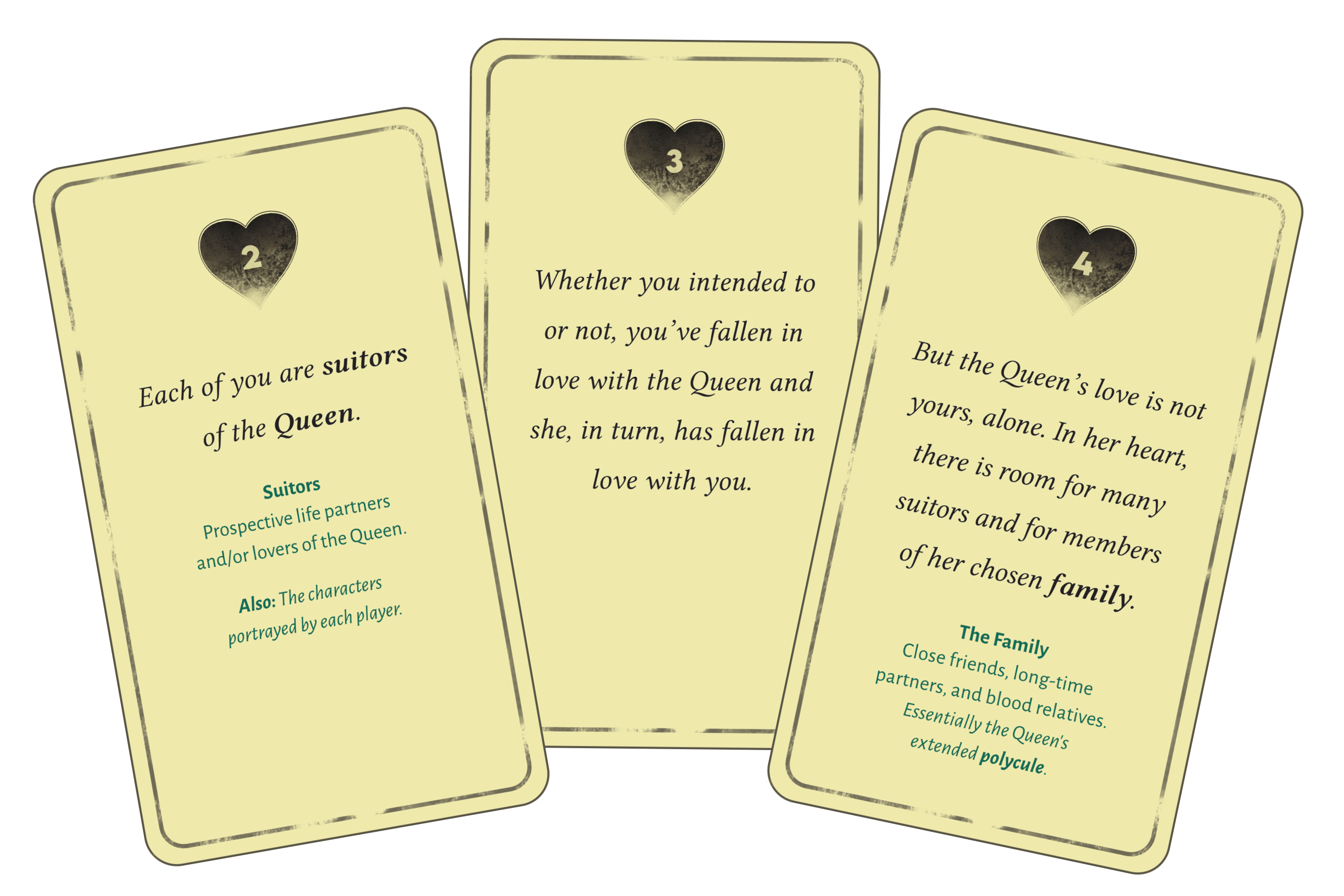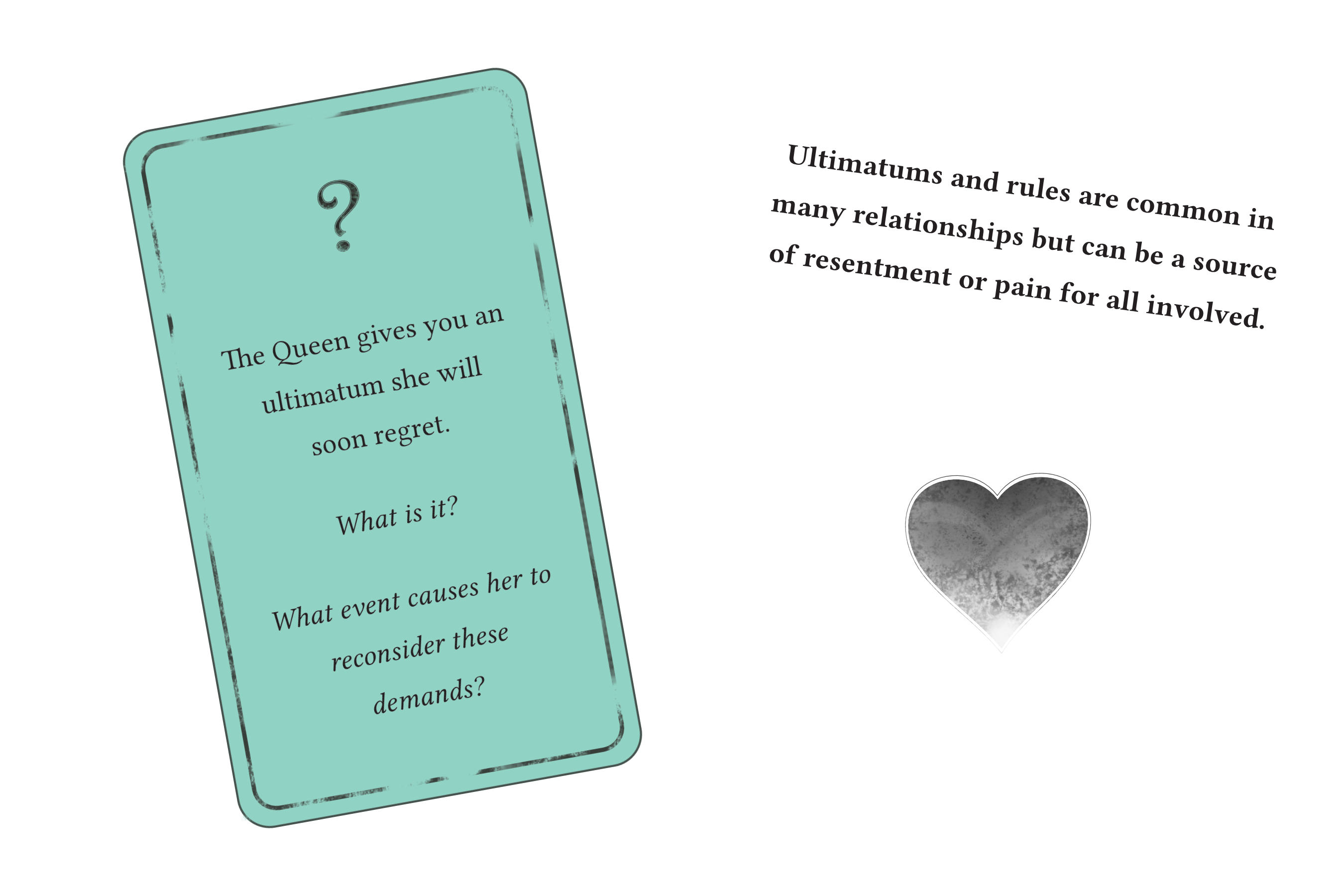Dissecting Compersion




What Is Compersion
This week I released a playtest of my polyamorous card-based roleplaying game, Compersion. I was able to do this thanks to Story Synth, a new website that facilitates the creation of html games using google sheets and some clever programming.
Compersion is a game I've had on the backburner for a while, and I intend to use this playtest to develop a physical game with art by polyamorous artists and designers. If you're already sold on the concept, follow my page and look for updates on that over the next year.
For those of you who either aren't as familiar with polyamorous culture, lingo, or philosophy, or for those of you who are interested in my motivation behind writing this game, this post is for you.

So, let's start with a little about me and my relationship to polyamory. For one, I've identified explicitly as polyamorous since about 2010. In terms of dating, I've gone through periods where I've dated a lot of different folks at once, I've been married, I've been in long-term polyamorous relationships, and I've been more or less "single." I've met a lot of good friends by either dating them or by participating in the larger community and, outside of the tabletop scene, I'd say polyamorous folks make up the majority of my social sphere.
Through all that I've always dated as an individual, never as part of a couple, and these days I'd say my relationship style leans towards what we call "solo-polyamory" or "relationship anarchy" and I personally try to stay away from hierarchy in regards to my relationships, be they romantic or platonic. This means I consider the feelings and needs of each partner individually and that platonic relationships are as important to me as romantic or sexual ones. Lucky you!
Interlude: Some Polyamorous Terminology
- ENM: An acronym standing for Ethical Non-Monogomy. This term is being used more and more in place of polyamory I believe as a way to clarify the ethical nature of most polyamorous relationships. It seems predominant on dating sites.
- Hierarchy: The idea that one person would be more important, romantically, than another. If you are in a hierarchal relationship it generally is visibly more similar to classical monogamous relationships, with one partner being your "primary" and the others being "secondary." There can be all kinds of reasons to prefer this relationship style (cultural expectations, religious views, or comfort levels). Folks who don't participate in this style of relationship are "non-hierarchal" or they may be practicing a version of Relationship Anarchy.
- Polycule: A group of folks connected by common romantic attachments. Generally the people with whom you and your partners are directly involved. An extended-polycule might include your partner's partners, or more.
- Solo-Polyamory: A polyamorous person who doesn't intend to enter into hierarchal or exclusive relationships. They tend to see polyamorous relationships as being made up of individuals rather than of pairs or "v"s.
- Triad: A group of three folks all romantically entangled with one another. Think of it like the less toxic version of a love-triangle. Some people call this a threesome though I do personally prefer that as a term.
- Relationship Anarchy: A wide-reaching philosophy on relationships that isn't limited to polyamory but definitely includes it. Generally a belief that consenting relationships should not be constrained to those reflecting traditional societal values.
- "V": Describes the basic building block of a polycule. A "v" is a relationship between three individuals two of whom share a romantic partner. That partner is the "hinge" of the V. If each of these people are romantically involved with one another, that's a triad.
Why Compersion?
Compersion is a non-dictionary term invented by polyamorous people to describe the feeling of finding joy in other peoples happiness. If you've ever been overcome with positive emotions when someone you know succeeds, if you've ever cried tears of joy at a friends wedding, or if you've ever blushed with lurid happiness at the sight of someone else receiving physical affection, you've enjoyed the sensation of compersion. Some people consider this feeling to be the opposite of jealousy, but I think it's more accurate to describe it as the antonym of schadenfreude, a German word describing the pleasure of seeing someone else experience misfortune.
This feeling is one of the big reasons I IDENTIFY as a polyamorous person: I feel compersion very strongly and always have. It's a good feeling, some people even find it addictive! Personally, despite the joy it gives me, I don't think it has inherent moral value. Neither jealousy nor compersion are good or bad, in and of themselves, nor do they validate or invalidate polyamorous feelings. What it has done is encourage me to think deeply about where such feelings come from and why others, especially monogomous writers and directors, find it so difficult to access in the context of mainstream storytelling.

Compersion, the game, is descended from For the Queen, by Alex Roberts. For the Queen is a simple prompt based game that I find so quick and easy to teach and play that I once roped in four random random bystanders into a game of it in the lobby of a busy airport. In that regard, the Descended from the Queen framework is a perfect fit for my own design because it allows me to focus my efforts on writing evocative text and on asking questions that, I hope, can help people to access that titular feeling of joy.
Ultimately Compersion isn't just about good vibes, though. Folks who have playtested the game can tell you that some of the questions are quite challenging. In fact, many of them are intended explicitly to invoke feelings of jealousy and strife, potentially complicating the player characters' budding polycule. While players always have the option to "X" these cards and tailor the content to their liking, I've included these experiences both precisely because they evoke conversation, because they play into stereotypes about polyamorous relationships that are sometimes true, and because they highlight some real-life struggles that I, myself, have had to work through.
One of the biggest challenges in writing a game like this one has been to imbue the cards with the spirit of my own experience. If I've done my job well, the hope is that my own authroship will be akin to a tertiary character in your story. In particular I have a lot to say in regards to the rules people place on others vs the boundaries we set for ourselves. While I will happily leave the details of that conversation up to you, the participants, I hope my own perspective will guide you towards a productive conversation.

For players of For the Queen, one of this games innovations is the introduction of special "infinity" cards that are addressed to the entire table. These prompts invite players to share in a single experience and really bring out the differences between each of the player characters. In the finished version of the game I'd like to develop more of these cards, and possibly additional mechanics, in order to support these interactions.
Please feel free to respond with any questions you have for me in regards to this game, the philosophy behind it, or my personal experiences as described here. If you would like to help me playtest the game, hit the download button, below, to go to the storysynth website. Any contributions you make towards the game now will go a long way towards encouraging me to create a finished product using this material.
Whether you choose to playtest the game or are simply interested in my thoughts on design, thank you for reading this.
Yours in joy,
-Justin F.
-----------------
Post Script: Some Reading Material
- Whether or not you are polyamorous, I think you might benefit from a better understanding of the relationship escalator and the grip it holds on you with Stepping Off The Relationship Escalator by Amy Gahran.
- For folks who have dabbled with polyamory, Polysecure, by Jessica Fern, is considred by many people I know to be one of the best books written FOR polyamorous people.
- Widely considered the ultimate book on polyamory, The Ethical Slut paved the way for folks who didn't fit into the monogamous paradigm.
Files
Get Compersion
Compersion
A game of polyamorous love and reflection, Descended from the Queen
| Status | Prototype |
| Category | Physical game |
| Author | Dissonance |
| Genre | Card Game |
| Tags | dftq, polyamory, Romance, storysynth, Tabletop role-playing game |
More posts
- Major UpdateSep 15, 2022

Leave a comment
Log in with itch.io to leave a comment.